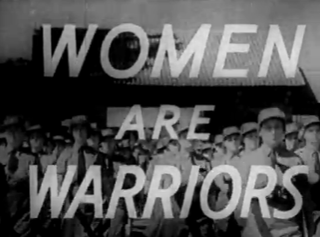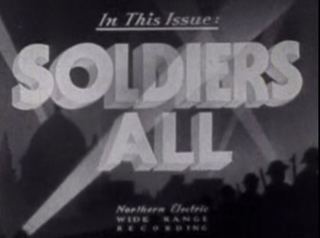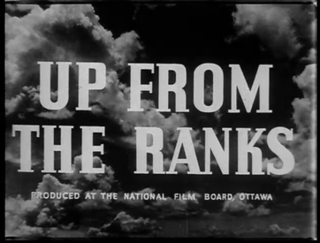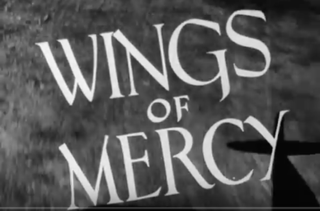Canada Carries On was a series of short films by the National Film Board of Canada which ran from 1940 to 1959. The series was created as morale-boosting propaganda films during the Second World War. With the end of the war, the series lost its financial backing from the Wartime Information Board, but continued as an NFB series of theatrical shorts that included newsreels as well as animated shorts.

Atlantic Patrol is a 1940 Canadian short documentary film, part of the Canada Carries On series of short films by the National Film Board of Canada, produced for the Office of Public Information.

The Home Front is a 10-minute 1940 Canadian documentary film, made by the National Film Board of Canada (NFB) as part of the wartime Canada Carries On series. The film was produced and directed by Stanley Hawes.

Women Are Warriors is a 14-minute 1942 Canadian documentary film, made by the National Film Board of Canada (NFB) as part of the wartime Canada Carries On series, and dealt with women in war. The film was produced by Raymond Spottiswoode and written and directed by Jane Marsh. The film's French version title is Les Femmes dans la mêlée.

U.N.R.R.A. presents In the Wake of the Armies ... is a 13-minute 1944 Canadian documentary film, made by the National Film Board of Canada (NFB) for the United Nations Relief and Rehabilitation Administration (UNRRA), as part of the wartime Canada Carries On series. The film, directed and edited by Guy Glover, described the work of the UNRRA during the Second World War and Canada's role in the relief agency. The film's French version title is À la suite de nos armées viendra l'entraide.

Portrait of Canada is a 10-minute 1959 Canadian documentary film, made by the National Film Board of Canada (NFB) as part of the postwar Canada Carries On series. The film, directed by Guy Glover, described the creation of the All Canadian Atlas. The film's French version title is L'Atlas du Canada.

Screaming Jets is an 11-minute 1951 Canadian documentary film, made by the National Film Board of Canada (NFB) as part of the postwar Canada Carries On series. The film, directed by Jack Olsen and produced by Sydney Newman, depicted the contemporary Canadian and international aircraft in production and on the drawing boards. The film's French version title is Avions à réaction.

Proudly She Marches is an 18-minute 1943 Canadian documentary film, made by the National Film Board of Canada (NFB) as part of the wartime Canada Carries On series. The film, directed by Jane Marsh and produced by Raymond Spottiswoode, described the work of Canadian women in uniform during the Second World War. The film's French version is titled Carrières de femmes.

Inside Fighting Canada is an 11-minute 1942 Canadian documentary film, made by the National Film Board of Canada (NFB) as part of the wartime Canada Carries On series. The film, written and directed by Jane Marsh and produced by James Beveridge, was an account of the Canadian military during the Second World War. The film's French version is titled Canada en guerre.

Industrial Canada is a 1958 18-minute Canadian short National Film Board of Canada (NFB) documentary film produced, directed and edited by Guy L. Coté for the Canadian Broadcasting Corporation (CBC) television series, as part of the postwar Canada Carries On series. Industrial Canada documents the industrial development of Canada during the mid-1950s. The film's French version title is Le Canada industriel.

Letter from Aldershot is a nine-minute 1940 Canadian documentary film, made by the National Film Board of Canada (NFB) as part of the wartime Canada Carries On series. The film was directed by John Taylor and produced by Stuart Legg.

Heroes of the Atlantic is a 1941 15-minute Canadian short documentary film, part of the Canada Carries On series of wartime films by the National Film Board of Canada (NFB), produced for the Office of Public Information. The film documented the work of the Royal Canadian Navy and the Merchant Marine during the Battle of the Atlantic in the Second World War. Heroes of the Atlantic was directed by J.D. Davidson and produced by Stanley Hawes.

Wounded in Action is a 22-minute Canadian documentary film made in 1944. It was made by the National Film Board of Canada (NFB) as part of the wartime Canada Carries On series. The film documents the work carried out by medical services in saving the lives of those who are wounded in action during the Second World War. The French version title of Wounded in Action is Blessé au combat.

Letter from Camp Borden is a 17-minute 1941 Canadian documentary film, made by the National Film Board of Canada (NFB) as part of the wartime Canada Carries On series. The film was directed by Raymond Spottiswoode and produced by Stuart Legg. Letter from Camp Borden chronicles the experiences in 1941 of a number of soldiers training at the Canadian Army's Camp Borden during wartime.

Soldiers All is a 20-minute 1941 Canadian documentary film, made by the National Film Board of Canada as part of the wartime Canada Carries On series. The film was directed and produced by Stuart Legg. Soldiers All describes the experiences in 1941 of soldiers, airmen and sailors in Great Britain and Canada during wartime. The film's French version title is Frères d'armes.

Back to Jobs is a nine-minute 1945 Canadian documentary film, made by the National Film Board of Canada (NFB) as part of the postwar Canada Carries On series. The film describes soldiers in the Second World War returning home and back to a civilian life. The French version title of Back to Jobs is Nos soldats reviennent .

Letter from Overseas is a 15-minute 1943 Canadian documentary film, made by the National Film Board of Canada (NFB) as part of the wartime The World in Action series. The film describes the training and operational use of Canadian Army soldiers in 1943 during the Second World War.

Up from the Ranks is a 19-minute 1943 Canadian docudrama film, made by the National Film Board of Canada (NFB) as part of the wartime Canada Carries On series. The film, directed by Julian Roffman and produced by Raymond Spottiswoode, described the training of Canadian Army officers to take on command responsibilities during the Second World War.

Air Cadets is a 15-minute 1944 Canadian documentary film, made by the National Film Board of Canada (NFB) as part of the wartime Canada Carries On series. The film describes the Air Cadet Movement in 1944 during the Second World War. Air Cadets was directed by Jane Marsh, who was also the writer and editor on the production. The film's French version title is Les Cadets de l'air.

Wings of Mercy is a 21-minute 1947 Canadian documentary film made by the National Film Board of Canada (NFB), written, directed and produced by the team of Evelyn Spice Cherry and her husband, Lawrence. The film describes the formation and operational use of the Saskatchewan Air Ambulance service. The NFB production was later re-edited into a shorter, 11-minute film, Mercy Flight, released in 1948.



















